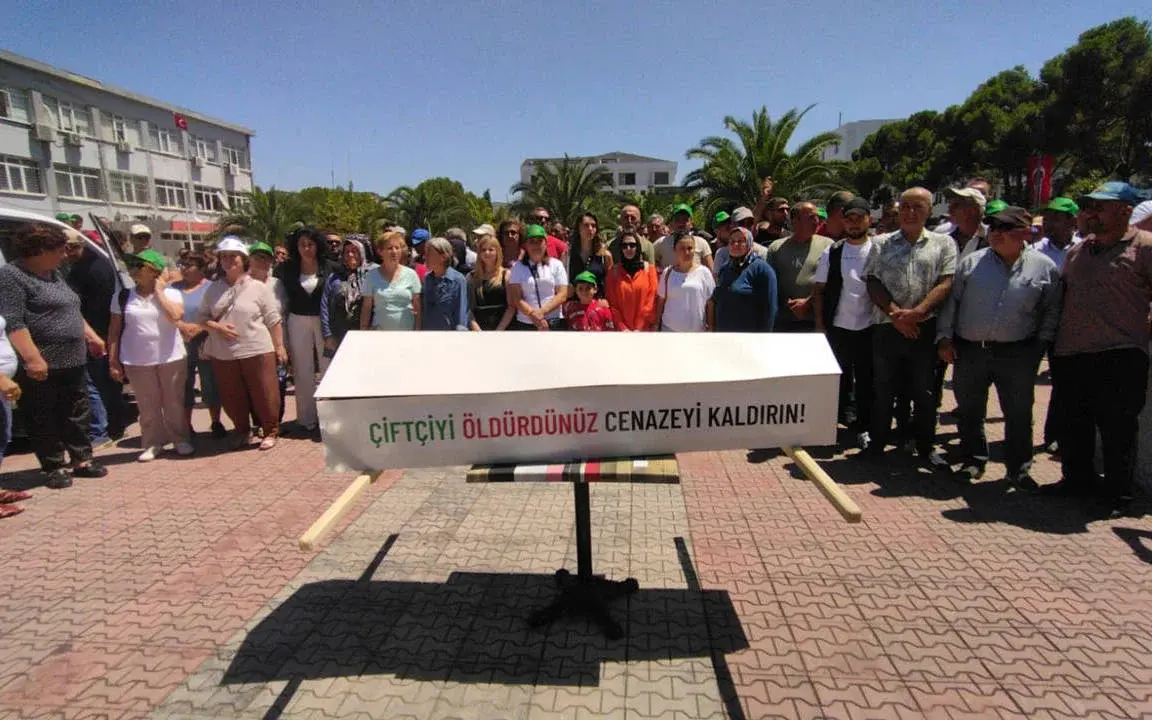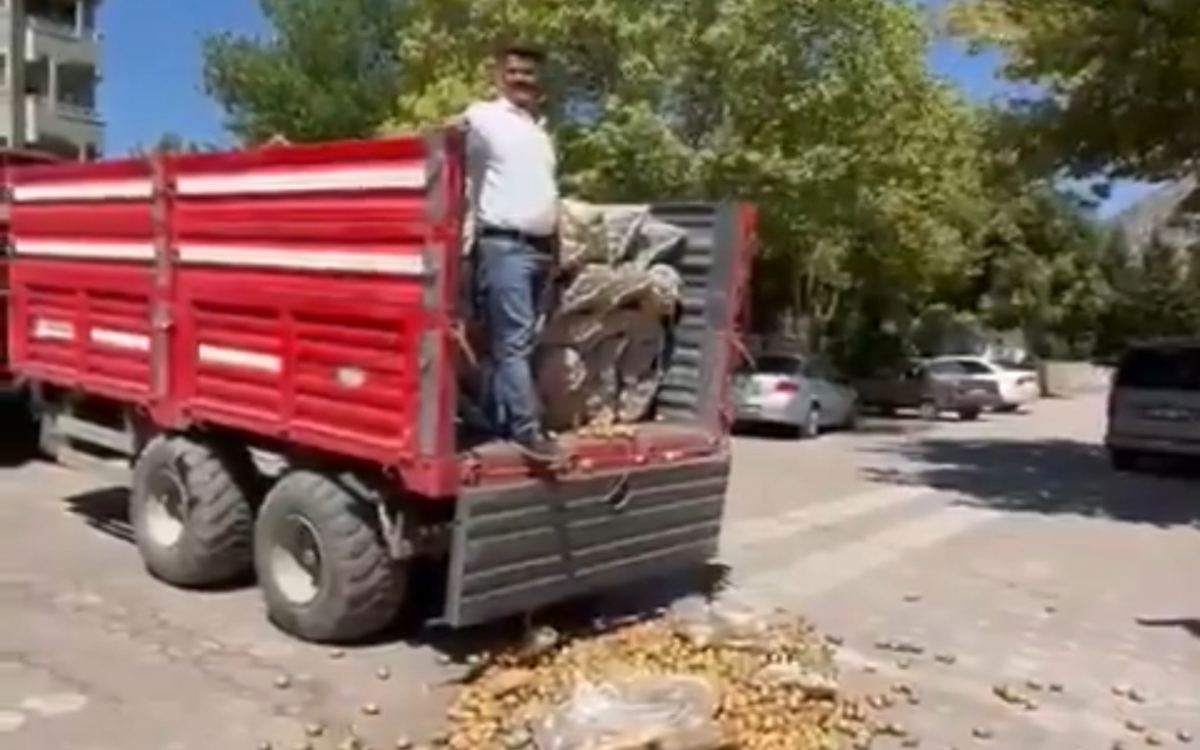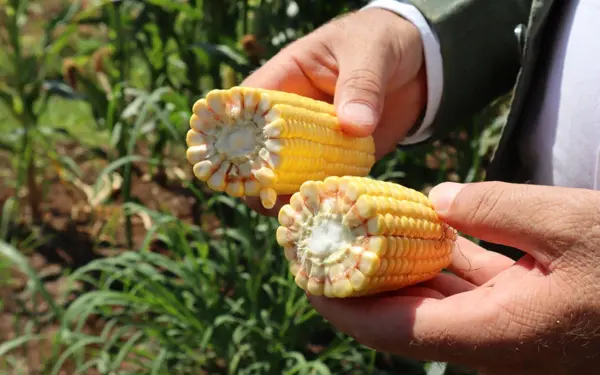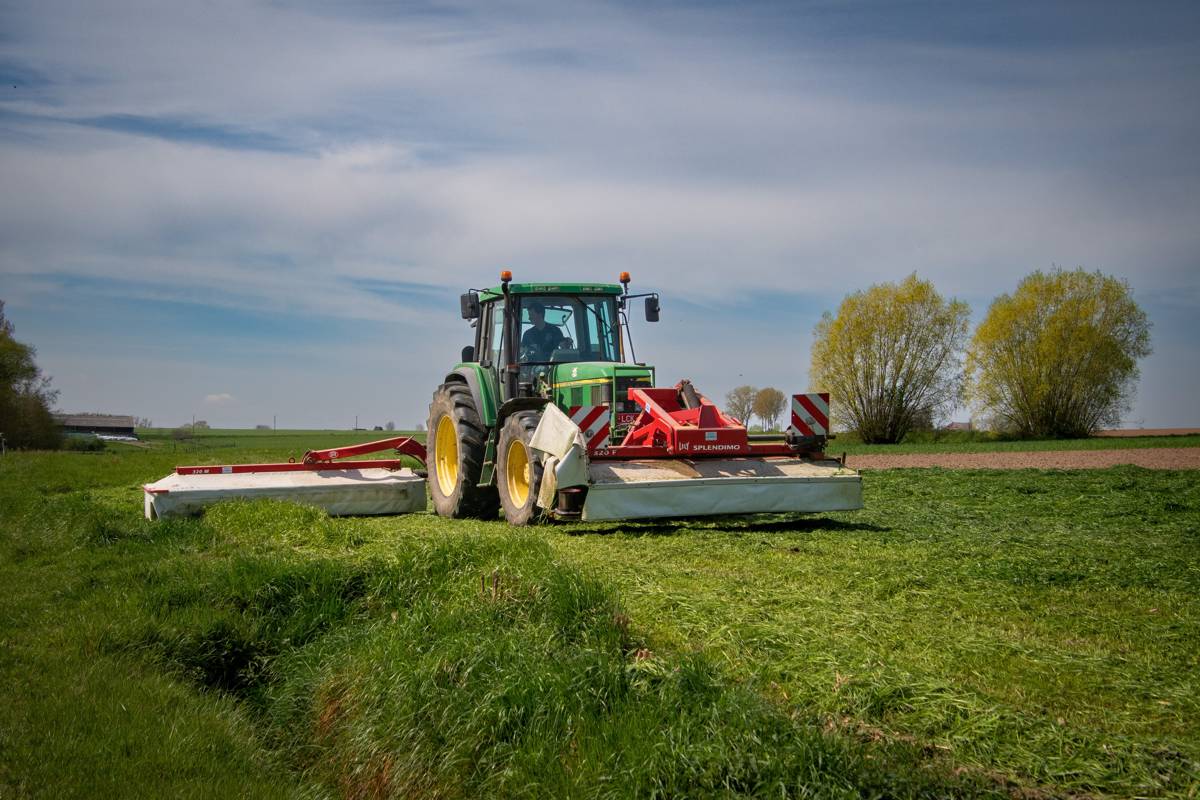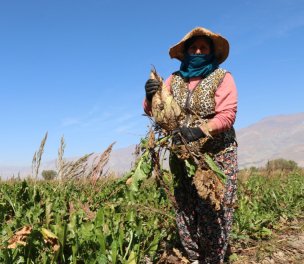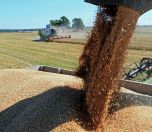Farmer protests have erupted across Turkey throughout August, as growers rally against rising production costs and insufficient crop prices.
Farmers are blocking roads with tractors, dumping produce such as tomatoes onto streets, and handing out free melons and watermelons to draw attention to their plight in various places across the country.
The primary driver behind these protests is the widening gap between increasing input costs, including diesel, fertilizer, and pesticides, and the stagnant prices for their products, which are failing to cover these increased expenses.
Here is a compilation of the protests between August 1 and 21:
August 1: Tomato producers on the streets in İzmir
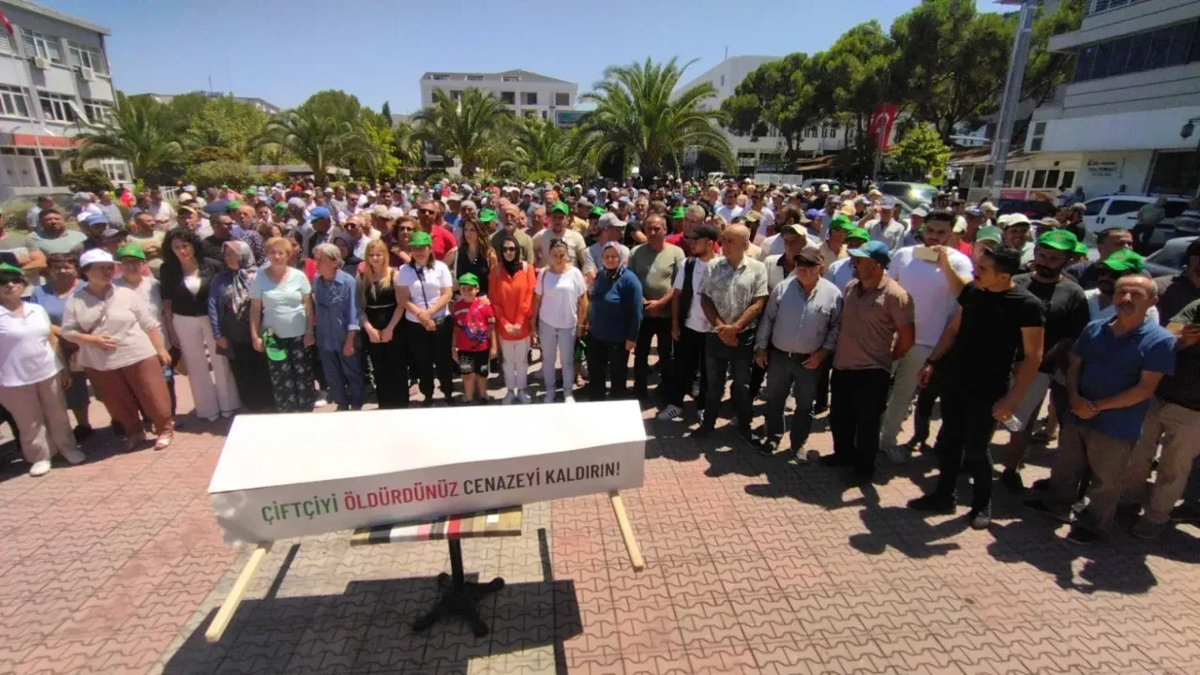
Tomato tomato producers in Kınık district of İzmir protested against the drop in the price of tomato paste below 2 liras per kilogram, which was set at 5 liras.
Tomato producers who came to Kınık Cumhuriyet Square marched to Government Square and blocked the roads leading to the district center with tractors. They left a coffin with the inscription “You killed the farmer, remove the funeral”. Farmers producing different vegetables such as watermelon and potatoes also supported the protest.
The farmers stated that costs have increased 15 times and the price of tomatoes in the field is lower than it was 3 years ago.
Farmers said, “We are giving our products almost for free where costs have increased 15 times. Neither the chambers of agriculture, nor cooperatives, nor district agriculture, no one is on our side. They are only with the bureaucracy, not the farmers.”
August 4: Pistachio farmers protest with tractors
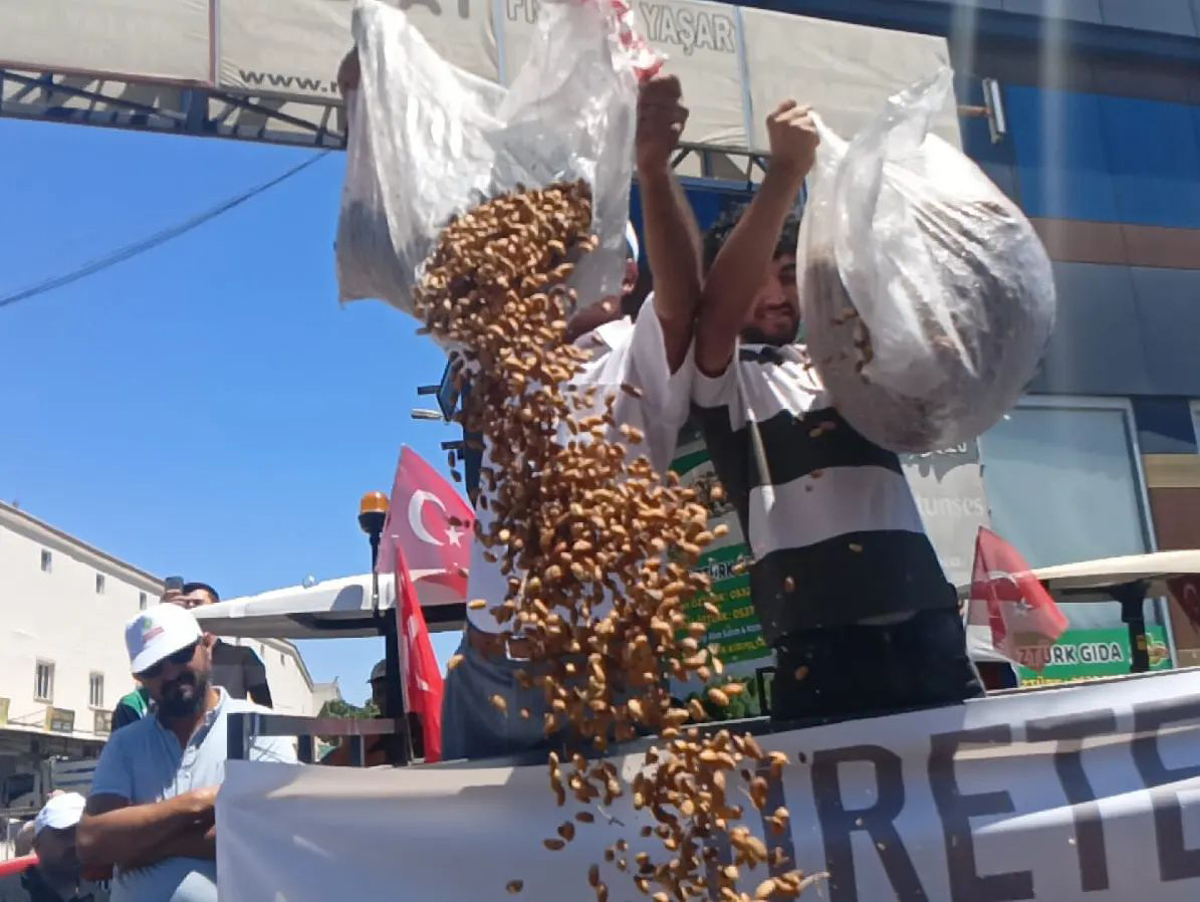
Pistachio producers in Antep protested against the prices of fresh pistachios, which were set between 90-100 liras per kilogram, stating that they could not get the return of their labor.
Farmers set out with tractors in the Barak Plain, the production center of pistachios in Antep. They arrived in front of Nizip Pistachio Market with more than a hundred tractors. Producers reacted to the prices announced by the traders and dumped sacks of pistachios on the ground.
A pistachio producer made a statement here and said, “Our pistachio, which we produce with a lot of labor, was sold for 100 liras last year and it is sold for 100 liras this year. If the traders want, it can be sold for 80 liras. Previously there was Southeastern Union but it was closed down. If it had not closed down, the state would have set a floor price and our goods would not have gone so cheaply. It was supposedly called 'green gold' for pistachio, but it has turned from gold to silver.
August 8: Farmers block İzmir-İstanbul road in Bursa
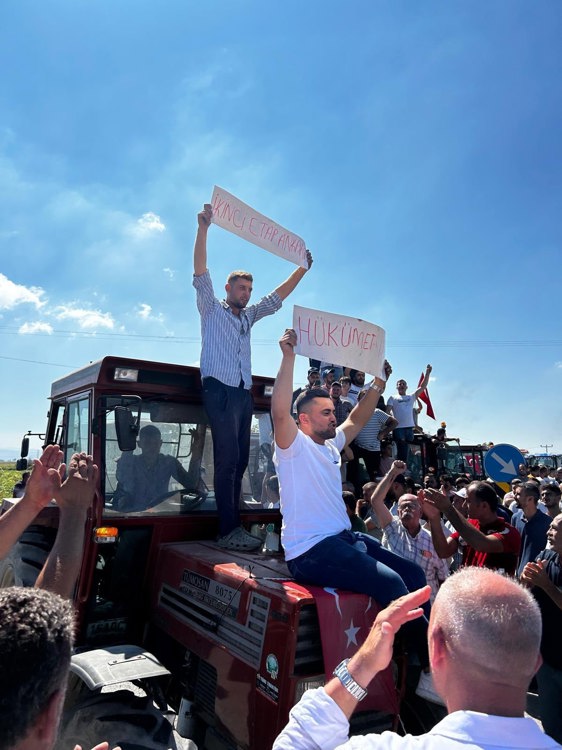
In Bursa, farmers from Mustafakemalpaşa and Karacabey took to the streets to show their reactions to the increasing costs and low sales prices.
Approximately 5 thousand farmers gathered outside the General Directorate of Agricultural Enterprises (TİGEM) in Karacabey with the call of chambers of agriculture.
The farmers, who stated that their products were not worth money despite the increasing costs and that they suffered losses, blocked the Bursa-Balıkesir highway in order to make their voices heard.
Gendarmerie and riot police teams tried to prevent the farmers who demanded the return for their labor. During the tense protest, tomato producers chanted slogans such as “Let the hands reaching the farmer be broken”, “Government resign”, “Farmer protect your crop”.
Mehmet Aydemir, President of Mustafakemalpaşa Chamber of Agriculture, said that farmers have endured the costs of many products, especially peas, onions, wheat, barley, melon, watermelon and industrial tomatoes, but they have suffered losses due to low prices rather than getting the return for their labor.
Supporting the protest, CHP Bursa MP Orhan Sarıbal said, “In the region that produces the most tomatoes for tomato paste in Turkey, a product that cost 3 liras in the field has unfortunately fallen to 2 lira 30 kurus in the free market. The farmer is really in a great loss and despair. Tens of trucks of the product unfortunately went to pastures and went to animal feed.”
August 11: Apricot producers outside TMO in Malatya
Apricot producers in Malatya protested outside the Turkish Grain Board (TMO) in reaction to the low price of apricots due to the lack of a base price for apricots.
Speaking on behalf of the farmers, Tüm Köy Sen Malatya Branch Spokesperson Adil Aktaş said that apricot producers have been facing serious economic problems in recent years and that the prices given to their products have been insufficient.
“Apricot producers in Malatya have become toys in the hands of people with loan shark mentality. TMO did not lift a finger and did not announce apricot purchase prices. As of last year, the daily wages of apricot workers were 450 liras, while this year it was 1200 liras. The price of a liter of diesel, which was sold at 19.61 liras last year, has now reached 46 liras. In the face of the increase in all items from fertilizer, fuel, other inputs to labor, producers cannot get the value of the apricot they produce and are forced to sell their products cheaply.”
Farmers demanded that the base price of apricot be determined as soon as possible, the debts of producers be postponed without interest, interest-free loans be given to producers and SCT on diesel oil be removed.
August 12: All producers stand up in Balıkesir
Farmers from Balıkesir protested against the falling prices of agricultural products, especially tomatoes and melons.
The farmers, who stated that they suffered losses from the products they produce, gathered in Aksakal district of Bandırma. They took to the roads with about 200 tractors.
Speaking at the protest, Süleyman Dönmez, President of Bandırma Chamber of Agriculture, stated that the producer sales price of products such as tomato paste, melon, watermelon, corn has fallen below the cost this season and that the farmers have suffered losses from the products they grow.
Dönmez said, “Industrialists made a commitment of 3.75 liras for tomato paste in return for contracted production, but the industrialists slowed down their purchases as prices fell in the open market. In the free market, the price per kilogram of industrial tomato varies between 1.5-2 liras. This situation works against the producer,” he said.
Stating that the prices in the open market should be at least 3.25-3.50 liras and only then the commitments made by the industrialists will be fulfilled and the contracting producers will be able to earn the income they deserve, Dönmez said, “If it goes like this, the producer cannot pay his debt. Yields are also low due to the heat. The producer is currently losing between 10-15 thousand liras per decare,” he said and asked for the farmer's voice to be listened to.
August 12: Farmers in Manisa distribute 600 tons of melons and watermelons for free
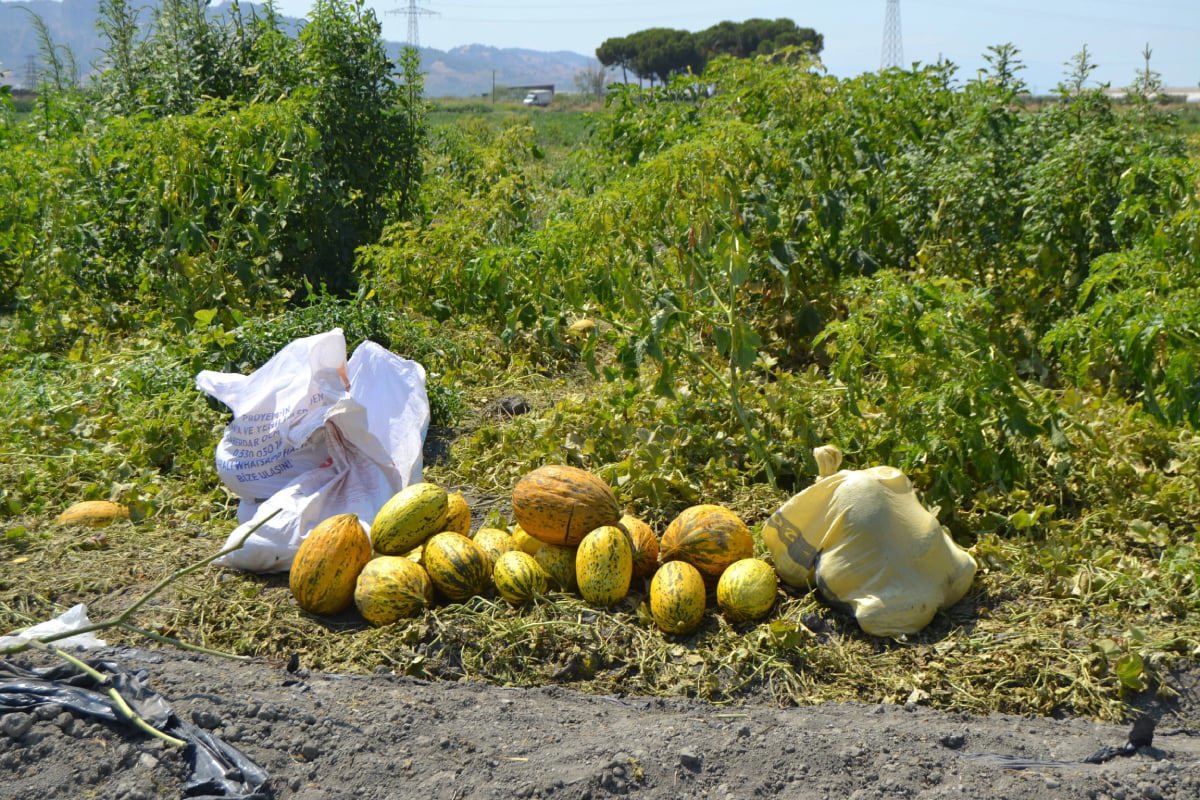
In Salihli, Manisa, three partner farmers distributed about 600 tons of melons and watermelons in the field for free when they could not sell their products at the price they wanted.
Ahmet Akbaş, Metin Akbaş and Eyüp Çakar, who planted melons and watermelons on 220 acres of land in Yılmaz Neighborhood, could not get the price they expected from the traders when the harvest time came. The three partners then decided to distribute the melons to citizens for free and made an announcement on social media. Citizens came to the field, harvested the melons and watermelons and took them away.
Ahmet Akbaş, one of the partners, made the following statement:
“The melon and watermelon cost us approximately 1.5 million liras. In the last 3-4 days, demand from traders started to come. There were some who came to the field and negotiated. But they all came with funny figures like 100-200-300 thousand. We felt bad to sell a product that cost us 1.5 million for 200-300 thousand. Instead, we gave it for free so that our villagers and people could benefit from it.”
August 13: Protest by farmers in Burdur
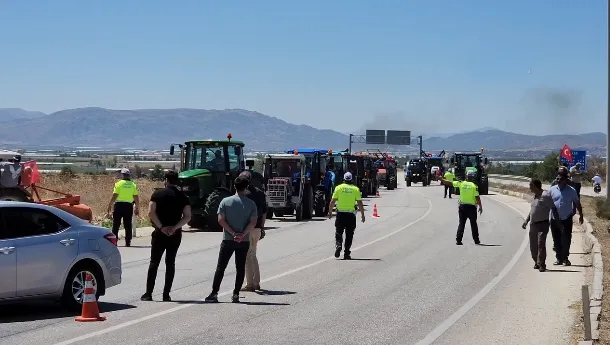
In Karamanlı, Burdur, farmers organized a tractor convoy to draw attention to increasing costs and production difficulties.
Farmers coming from Karamanlı, Tefenni, Yeşilova and Çavdır with their tractors called for support.
Speaking on behalf of the farmers, Özcan Şengül said, “The price of fuel, which was 22 liras in January 2023, reached 42 liras in February 2024 with an increase of up to 90 percent. We have expenses such as fertilizer, seed, medicine. These increased between 50 percent and 90 percent and became a huge mountain in front of our producers. It has made us unable to sow and produce. TMO cannot play an authorized role in price determination. It is late in setting prices. It throws us into the arms of factories and merchants. The farmer is resenting the land every year.”
August 13: Balıkesir farmers on the streets again
After the protest in Bandırma, Balıkesir, farmers took to the streets this time in Sındırgı. They gathered in Ibiller village and marched to Sındırgı district center. The farmers reacted to the price of 1.8 liras per kilogram of tomatoes.
They called the Ministry of Agriculture and Forestry to duty and chanted “government resign”.
Here, a producer said, “We were happy for the abundant crop because we would pay our debts and installments. Once in 40 years we had a bountiful harvest. But there is no money this time either.”
Another producer said, “Instead of saving money from the palace, reign, contractors and cronies, they put all the financial responsibility on the backs of the peasants.”
August 17: Farmers in Maraş dump their tomatoes on the road
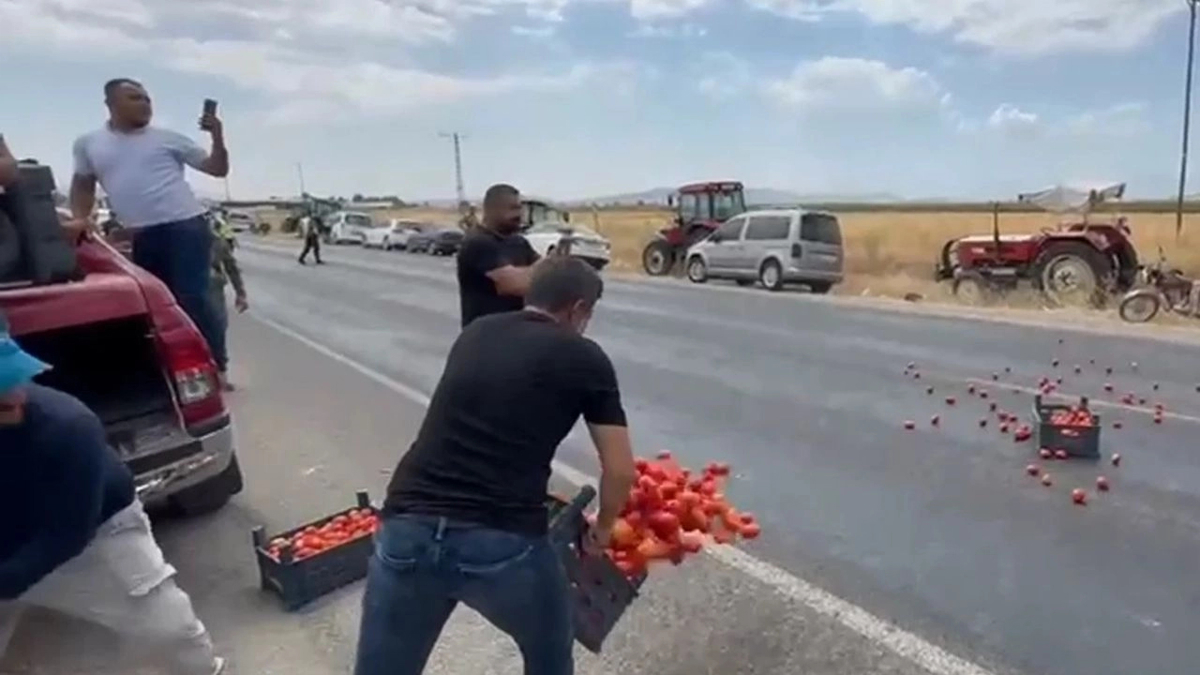
Tomato and pepper producers in Maraş protested against the prices not covering their costs. They formed a convoy with tractors.
The farmers left Narlı town with tractors and blocked the Maraş-Antepolis road. They dumped the remaining tomatoes on the road.
The farmers said, “We gathered to be the voice of our farmers who produce at high cost and sell their products at low prices. Maraş farmers are in a difficult situation. While selling sunflower seeds for 40 liras last year, today the price is 25-30 liras. While diesel was 20 liras, today it is 42 liras. While the worker's wage was 400 liras, today it is 800 liras.”
August 18: Protest also in Aksaray
Farmers from Aksaray also protested with tractors. Farmers gathered in Armutlu village and took to Aksaray-Adana highway.
They reacted to the increase in input costs and the loss of value of their products against inflation.
The farmers said, “We do not want alms, we want to be paid for our sweat.” Farmer Halil Demir, who participated in the protest, said, “If we sell our goods to pay our debts, we will lose money, if we don't, the bank will foreclose. We are in a dilemma; while the milk price is decreasing, feed prices are increasing. We cannot stop the rise in feed prices.”
August 19th: “We can't produce” protest by Eskisehir farmers
In Eskişehir, farmers wrote “We cannot produce” on the empty field with tractors, stating that they are in a difficult situation due to increasing input costs.
The group called “Eskişehir Young Rençberler” came together in Kalkanlı Neighborhood of Odunpazarı district to draw attention to the problems in production.
Cihangir Eryılmaz, one of the producers, said, “I am a farmer in Seyitgazi district. I produce sugar beet, corn and sunflower. We cannot produce anymore due to the excessive increase in costs. The knife is to the bone,” he said.
Birol Özsak, a farmer in Tepebaşı district, said, “I produce cereals, corn, sunflower and sugar beet. Due to the increase in our production costs and the low sales prices in 2024, we have difficulty in producing for 2025. We cannot produce after this time,” he said.
Burak Kuşan, a farmer in Alpu district, said, “I plant sugar beet, barley, wheat and corn. The product price we sold in 2023, we are currently selling at the same price or even lower despite the increasing input costs. Farming is ending, farming is being finished.”
August 20: Afşin farmers say they can't sell their products
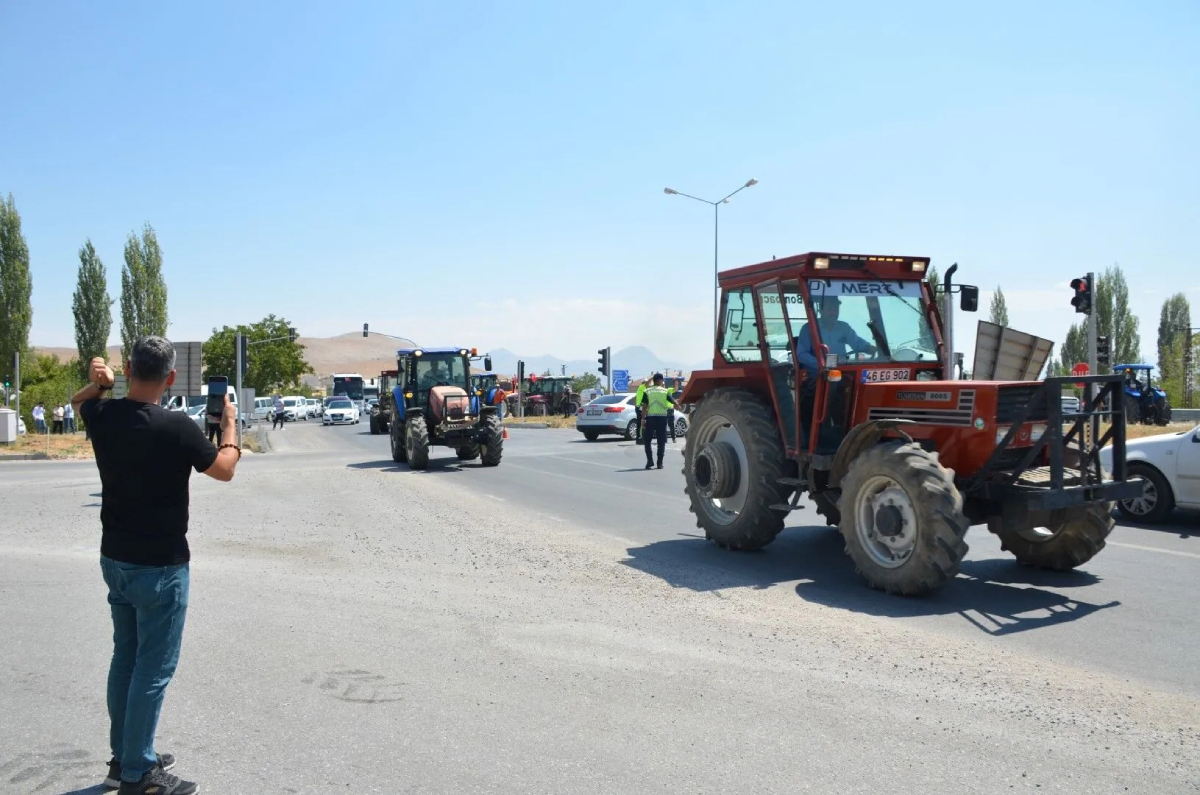
Farmers in Afşin organized a convoy with their tractors to protest against rising costs and difficulties in finding buyers for their products.
The farmers gathered at the Erçene road junction and addressed the government, stating that they were facing many problems.
“The popcorn harvest in Afşin and Elbistan region has been completed, but we could not find a single customer. The products we sold for 18 liras last year cannot find a buyer even for 10 liras this year. There is no floor price set for sugar beet. We have no strength left to endure this hardship. We are trying to sell our tractors to Ziraat Bank to pay off our debts, but we have not been able to do this. The average age of farmers is 58, which poses a serious threat to the future of the agricultural sector. We leave home every morning at 5 a.m. and come back at 12 at night, but there is no profit.”
August 21: Farmer's struggle against municipality in Konya
In Karatay, Konya, farmer Abdullah Koyuncu protested against both the government and the municipality outside the municipality building after the municipal police confiscated his melons. Stating that he was not allowed to sell his products, the farmer expressed that he was experiencing economic depression.
Koyuncu could not sell the melons and watermelons he produced in his field this year through markets and market vendors, so he decided to sell them himself.
While trying to sell his products on Küçükkumköprü Street, the police confiscated the melons. When Koyuncu could not get his melons back despite his efforts, he protested outside the Karatay Municipality.
Throwing the melons he brought with him on the ground outside the municipality building, Koyuncu said, “These products will rot. Where will I sell them?” he asked. He stated that he would be in an economically difficult situation if his products were not returned.
“I am bankrupt as a farmer,” Koyuncu said, ”I owe 3 million liras. If I cannot sell this product, I am bankrupt. But the municipality teams say, 'Brother, you cannot sell this product. I say I am bankrupt if I can't sell this property. If I can't sell that property, I am on the verge of suicide.” Police detained Koyuncu during the protest.
August 21: In Karacabey, a farmer who was left with no produce dumped 30 tons of tomatoes on the ground with a ladle
Tomato producers in Karacabey, Bursa, who protested for 4 hours in the previous weeks, did not find a solution to their problems.
Finally, a producer couldn't sell about 30 tons of tomatoes that he had collected from the field and loaded onto a truck despite going from factory to factory, so he dumped them in an empty area near his house with a bucket. (HA/VK)





